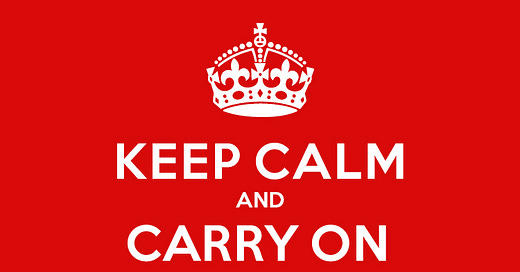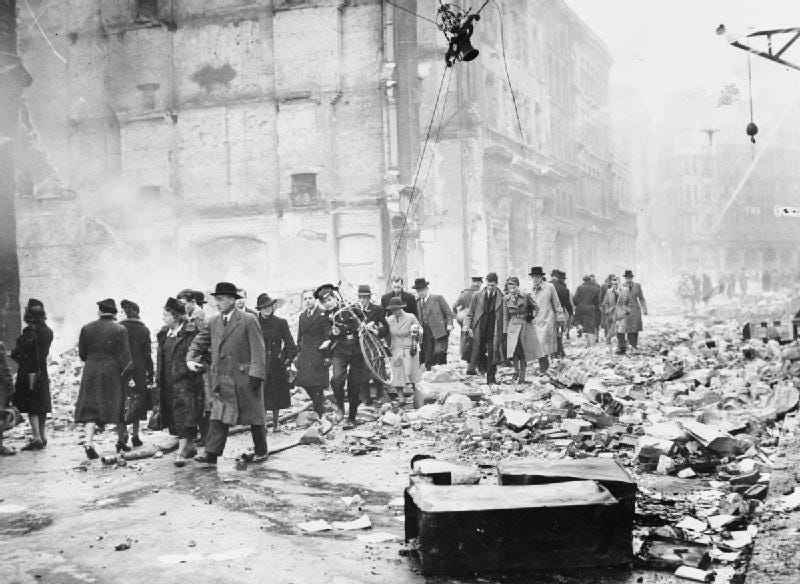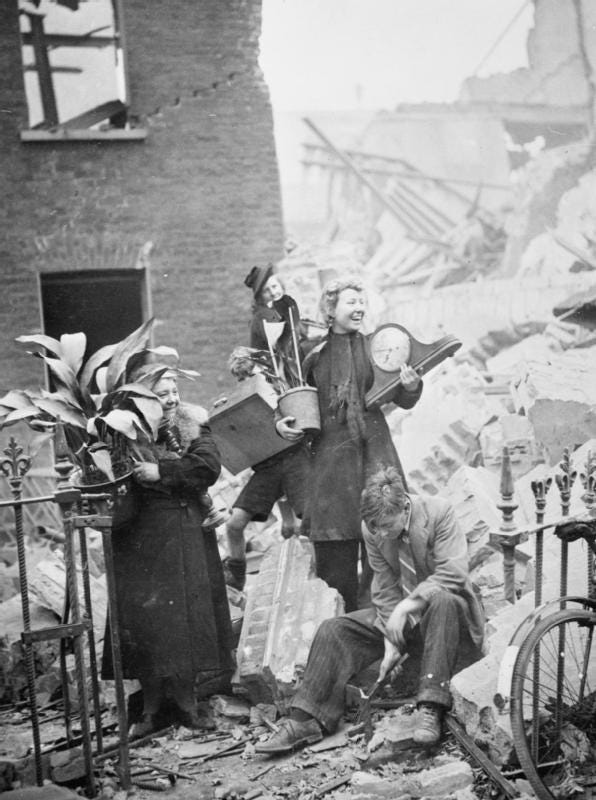The bombings began on September 7th.
First in London. But other cities followed. Birmingham. Coventry. Manchester.
It wasn’t a surprise. They knew they would come eventually. It was just a matter of time. And that time was now upon them.
By this point in WWII, Hitler had conquered much of Europe, with France just the most recent to succumb. But England held out. Refused to sign a peace treaty. A reluctant America still unwilling to enter the war. No matter. Churchill and the British people were going to fight.
The bombings came mostly in the day that first month. But then the German Luftwaffe (Air Force) discovered their real advantage: night bombings. And so it would go. Virtually every night. For years. The sirens would blare. And then the explosions. Destruction becoming routine. The impact seemingly random. One block completely destroyed, in rubble. The next, untouched.
The British government had planned for this. They worried that such relentless attacks would break the will of the people. In fact, the Germans regularly anticipated that surrender was right around the corner throughout much of the campaign.
The government had expected suicides. Mass evacuations. Outbreaks of crime. A breakdown of society, even.
But an amazing thing happened. The Brits “got on with it.” They adapted. They made the best of it. And they continued living their lives.
It’s incredible to think that they could have achieved anything even remotely close to normalcy when bombs were quite literally being dropped on them nightly. But that’s exactly what they did.
They woke up early, knowing their commutes would likely take them hours. Because of course, they kept going to work every day, even if it meant climbing through piles of rubble to get there. And they left work early, too, wanting to get home before the blackouts. Because, of course, every light in the city needed to be out by sundown so as not to provide targets for the Luftwaffe.
And so it went for years. Yet, the will of the British people would not be broken. Despite untold death and destruction and constant worry about whose luck might run out next, the Brits carried on.
We know today, 80 years later, that things eventually worked out for them. They weathered the storm.
Today, in a world that is much changed since 1940, but in some ways still surprisingly reflective of those trying days, we face another storm. A global pandemic. A devastating virus that has spread like wildfire, leaving death and suffering in its wake. Most of us probably never thought we’d have to face something like this in our lifetimes. But here we are.
Strangely, it’s both surreal and normal. The initial acceptance of what was happening might have been the hardest. “Wow, we’re really not going to work? We’re really can’t send our kids to school? This is actually happening?”
But that initial shock quickly shifted to a focus on taking care of essentials (toilet paper and face masks) and eventually to forging new routines.
In a way, our experience today is not dissimilar to that of the Brits who “carried on” living their lives in the midst of nightly Nazi attacks. We’ve adapted. We’ve come up with new ways of doing things. We speak of new outbreaks of the virus as the Brits spoke about bombings. Always shocking on one level, completely routine on another.
That’s not to say life is normal. At all. There are sharp reminders on a daily basis of this strange new reality we’re living in. It hits us at odd times. Seeing my kids in masks for the first time was a gut punch. I worried that their childhoods might look much different than mine or what I had hoped for them. Even professional sports, as they return to the fields and courts, are reminders of this eerie reality. Seeing a baseball player put his mask on after reaching first base hit me hard for some reason. “We’re living in a movie,” I thought. “How could this actually be happening?”
But it’s interesting that we don’t feel this sense of shock constantly. And that’s probably for good reason. Biologically, I suspect our bodies are not capable of living in a constant state of alarm. We have to see our new condition as normal, as routine. So we do. We adapt.
And to be honest, it’s impressive. I’m not sure I can say it’s uniquely human—as natural selection tells us that every species evolves over time. But it is human.
An incredible tragedy has unfolded before our eyes. Untold death and suffering. It’s horrendous. A nightmare. But we carry on. We adapt. Because there’s nothing else we can do. And strangely, it begins to feel normal.
My dad once gave me a paperweight with a Churchill quote on it as I struggled with a failure in my life (the CFA exams, which ultimately, I wrote a book about).
It says: Never, never, never quit.*
My dad liked quotes. And self-help. And he’s probably the reason I’m sitting here writing this article.
I think that’s a good quote to remember right now. Never, never, never quit.
Look, we’re not going to quit. Just like the Brits didn’t quit.** We’ll beat this thing and we’ll move on. We’ll survive.
In the meantime, let’s give ourselves some credit for adapting to this crazy reality we’re living in. It’s pretty damn impressive that we can make such extreme circumstances feel like routine.
But that’s what we do. And that’s what we’ll keep doing.
Never, never, never quitting.
Notes/corrections/movie quotes/pictures
*Incidentally, despite the fact that whatever is on paperweights or the Internet is always 100% true, I’m not totally sure Churchill ever said this in so many words. The quote may have been more along the lines of “Never, never, never give up.” but nobody likes a stickler for facts, so let’s just assume my paperweight is factually correct.
**I was really tempted to say “Was it over when the Germans bombed Pearl Harbor?” right here. If you don’t know what that means, I mean, c’mon, go watch Animal House. What are you even doing with your life?
***This article is in part inspired by the book The Splendid and the Vile by Erik Larson, which I am currently reading (and loving). I highly recommend it.
**** I’ve used the Keep Calm and Carry On image here as it seems just so appropriate, but interestingly and despite the fact that you cannot travel through Heathrow Airport without seeing it at least fifty times, the sign itself was never widely used during wartime. Millions of copies were printed by the Ministry of Information but never distributed and were ultimately destroyed. By accident of history, a picture of the sign was discovered in 2000, and over the last twenty years, has come to represent the epitome of British “stiff upper-lippedness.”
***** Below are a few more pictures, all sourced from Wikipedia and in the public domain that give you a sense for 1940 England in the midst of the bombings. Pretty amazing stuff.








Enjoyed this post and the linkage to history. Appreciate the message and how personal it is. Loved the final “footnotes” section. Never, never, never quit!